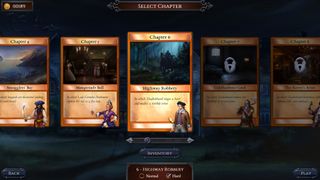Our Verdict
An ambitious game but one which exposes and compounds the weaknesses of solitaire.
PC Gamer's got your back
What is it? A combat-centric riff on classic card game, solitaire.
Expect to pay $15/£11.39
Developer Grey Alien Games
Publisher Positech Games
Reviewed on Windows 10, 16GB RAM, Intel Core i7-5820k, GeForce GTX 970
Multiplayer None
Link Official site
Regency Solitaire was one of my games of the year for 2015. It’s a Jane Austen-style love story through which you progress by playing hands of the card game, solitaire. It was easy to sink entire evenings into Regency Solitaire. Shadowhand is a prequel of sorts, following the adventures of one of the characters in her youthful highwaywoman days. The big difference with Shadowhand is that some rounds of solitaire now play out as turn-based duels.
Shadowhand uses a modified deck of cards with suits like guns, oak trees, swords and cups replacing the traditional four, and numbered 0-9. Each hand gives you an arrangement of cards already dealt out and a little draw deck. You use the revealed card from the draw deck to remove cards from the dealt pile by creating runs of numbers. Longer runs trigger combos which multiply the gold you earn from a hand and power weapons during duels.

Helping counter solitaire’s traditional problem where you’re at the mercy of card draw are passive and active abilities. I tend to play with the active options Charging Stallion (removes two random playable cards), Screaming Skull (removes one specific playable card) and Stand and Deliver (converts one card to loot). Having that much card removal means I can just brute force my way past troublesome cards.
Duelling uses these same principles but you take turns with an AI character. Runs of cards charge up your weapons, and some suits can be used to speed up particular weapon charges. This is true for you and the AI so you need to pay more attention to the individual cards, sometimes making what would be a terrible choice in the regular hands of solitaire, sacrificing your own run of cards in order to make life harder for the opponent.
Additionally, gear like smoke bombs, wig powder, health potions and the like can be equipped for these duels, and outfits can be cobbled together to boost or reduce useful stats. For example, I have a Luxuriant Beard which gives me a 10% chance to resist stuns.

Shadowhand is ambitious, and the early rounds of duelling were a curious change of pace. But as the game progressed I found them frustrating. The combat exposes the weaknesses inherent in solitaire rather than glossing them or celebrating them.
For the non-combat rounds of solitaire you might need to retry a level multiple times, but those restarts become part of a gentle cycle. One hand didn't work out? Then get the game to deal you in again and off you go for another attempt. Maybe you rejig your active abilities but generally you just play as many rounds as it takes to get the result you want.
In combat, the experience feels very different. Card draw going against you can feel pretty bitter, and combines with particular weapons and effects to make some fights absolutely miserable. One particular round saw me take one turn, then the enemy got a run of great combos and stuns which left me just watching powerlessly as my health went from 96 to 16. At that point there was no point completing the fight so I restarted.
After a while you get a sense of when a hand is worth playing through and when it’s better to save time and just restart, hoping for better luck with the draw. You might also use that opportunity to switch your loadout up a bit, but sometimes it really is just as simple as trying again with the exact same tools and getting a far better result. Against one late-game boss, I lost about three quarters of my health early on, restarted the fight and bested her handily when the cards went my way instead of hers. There’s just too much random number generation, despite the many options to try and move the odds into your favour.

There’s also something deeply frustrating about switching from regular solitaire to a mode where you need to tactically drop combos. It’s interesting in an abstract, mechanical appreciation way, but when playing I found it unsatisfying to watch combos go unfulfilled as I ground out a fight.
Respeccing my character for each enemy was a finicky, boring experience. It could be improved if you could create loadouts—one to deal with fire, one to deal with piercing damage and so on. As it is, you need to go through outfit and weapon options each time and swap items individually. You can’t even filter them by the particular effect you’re after.
I think that a few quality of life changes would go a long way to improving the experience, or at least sanding down rougher edges. Whether a weapon is classed as land or sea will sometimes affect how proficient a character is in using it, so explicitly labelling which weapons are land and sea in your arsenal would remove one layer of awkwardness. Being able to create loadouts or filter your inventory by function would streamline preparing for a new enemy. Listing gear by whether it’s offensive or defensive would stop me scouring lists instead of diving back into the action. Showing me my current star ratings on completed chapters would tempt me to go back with my now-overpowered loadouts and dispense some highway justice for some fools, instead of not telling me where I fell short.

I’m not going to pretend to know if these are easy or hard to implement technically, but they would all take some of the pebbles out of the shoe. The digital pebbles out of the game shoe. You know what I mean.
This all obscures the real charm of features Shadowhand retains from Regency Solitaire. You get segments of that absorbing pleasure, but the game kept turning into a grind, losing momentum. That, in turn, recasts the light storytelling (which was a pleasant backdrop in the previous game) as a rather convoluted but shallow plot which I kept losing track of during drawn-out boss fights. The characters here felt more prone to slipping into caricature too.
An interesting conundrum is whether to recommend it to someone who enjoyed Regency Solitaire. I think there’s still fun to be had, and it offers whole chunks of what amounts to more Regency Solitaire levels, but it’s harder to love and sorely in need of some tweaking.
An ambitious game but one which exposes and compounds the weaknesses of solitaire.

